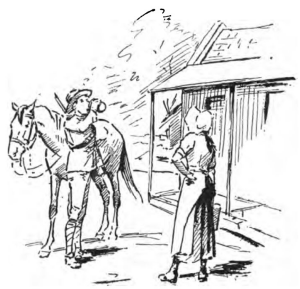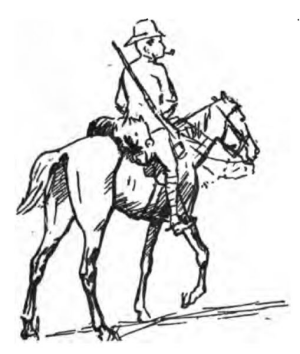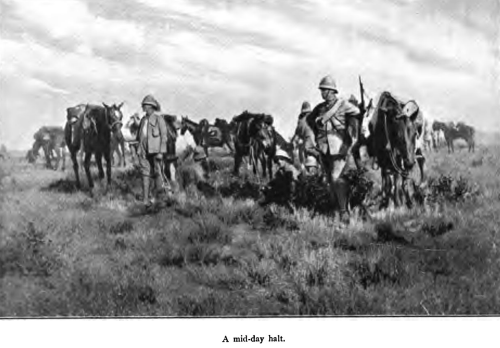|
AT Villiersdorp the banks of the Vaal are much higher than at Fourteen
Streams, and from our position on the high bluff overlooking the river it
was a fine sight to watch the long line of troops, artillery, mule and ox
waggons, and Cape- carts winding down the rough steep road to the drift and
up on the other side. From a distance everything seemed to move like
clockwork, but down below all was bustle and excitement, the native drivers
screaming and yelling at their teams, and cracking their whips with a noise
like rifle shots! —the transport officers shouting orders and directions
from one side of the river to the other, and getting hysterical over men
driving badly, and waggons sticking! The road on the other side was crowded
with men pushing and pulling at the waggons—running up beside the teams—one
to each mule— and making rude but encouraging remarks, while they whacked
them with sticks or belts; every one in earnest— sweating, blown, and nearly
blinded and choked by the clouds of dust stirred up by so much traffic. At
night, when the fires were lit, the camp looked like a large town.

By dusk, on 1st July, the
convoy, which had taken a day and a half to get over, was all safely on the
other side, and trekking towards the town of Frankfort. So, our little brush
with the Boer snipers over, we left our post on the heights to cross the
drift and push on after it. About a dozen men were left as rear-guard to
cover our passage, with Instructions to follow as soon as they saw us
across. They did not, however, make up on us at once, so three men were sent
back to look for them. The rear-guard soon joined us, but the others did not
put in an appearance till the following night, and there was much
speculation as to their probable fate. We thought they must certainly have
fallen into the hands of the Boers behind us. It seems they had gone away
back across the river, meeting neither our men nor the Boers, and had taken
a wrong road in the dark on their return. Late at night they put up at a
farm, and getting on the trail next day joined us at Frankfort in the
evening, just in time to escape being reported missing. They had been
hospitably received at another Boer farm during the day, the women-folk
bringing Out coffee, bread, and eggs, for which they would accept nothing.
Whether the Boer women became more vindictive as the war dragged on, or this
family only happened to be more than usually amiable, it is difficult to
say; but certainly, after we had gained more experience, we should have
feared to put off much time under such circumstances, lest while treating us
so well they should be treacherously planning our capture.
We stayed one
day at Frankfort, and here the C. I.V.'s left with a convoy of sick for
Heilbron. Here, too, we were joined by Macdonald with his Highland Brigade.
The following day our company was fired on while riding along a valley in
extended order. A few Boers held a hill on our left and opened on us at
pretty long range. Four men who halted at some kraals on the left of our
line were hotly peppered as they mounted and galloped over to the rise from
which their troop was returning the fire. For the next three days, while we
marched south to Reitz, the snipers hung persistently round the column and
gave a lot of trouble, but did little or no damage. These little incidents,
trivial in themselves, show how gradually we became used to encountering the
enemy, so that when at length we did meet them in earnest we did not feel
altogether like raw troops. At Heidelberg Colonel Burn had joined General
Ridley's staff, so the two companies were now under the adjutant, Captain
Vereker. On 7th July we entered Reitz, and at once took an intense dislike
to it. A few of the houses had gardens, but the majority were just planted
down on the bare ground with some heaps of unused building material about
the doors, to show that they really had been built in position, and not
simply brought along and set down whole, as appeared. Perhaps the horrid
stench of dead horses, and the sight of them in the surrounding ponds, may
have bred our dislike. Certain it is, that afterwards, when we were wont to
picture ourselves as doomed to trek for ever and ever after De Wet in the
Orange River ColonSr, we would talk of another visit to Reitz as the climax
of our woes. From Reitz we went to Heilbron, four days' march, as guard to
an empty convoy, which, after filling up, was to rejoin the column at
Bethlehem.
 The
country through which we had been passing since leaving Johannesburg was
totally different from the bleak and thorn-grown lands on the western border
of the Transvaal. It was principally fine rolling veldt, with here and there
kopjes and flat-topped hills. The farms, too, were generally better built,
and good gardens with orchards were much more common. The grass, often more
than a foot high, was as dry as tinder, and fires were of daily occurrence.
Some we started ourselves, at least the smokers did through carelessness,
but most were lit by the Boers at nightfall as signals, and to locate our
camps. The fires made a grand show after dark, and our camps were often
quite lit up by the glare. We once saw it stated with all seriousness in a
standard home magazine that in South Africa the soldiers were in the habit
of cooking their food at veldt fires, and had often to run several miles
while boiling a pan of water! It is certainly a most amusing idea to picture
a man having to run a mile or two holding his pan over the fire all the
time, but would be little fun to the poor fellow who had to depend on making
his tea in such a manner. The
country through which we had been passing since leaving Johannesburg was
totally different from the bleak and thorn-grown lands on the western border
of the Transvaal. It was principally fine rolling veldt, with here and there
kopjes and flat-topped hills. The farms, too, were generally better built,
and good gardens with orchards were much more common. The grass, often more
than a foot high, was as dry as tinder, and fires were of daily occurrence.
Some we started ourselves, at least the smokers did through carelessness,
but most were lit by the Boers at nightfall as signals, and to locate our
camps. The fires made a grand show after dark, and our camps were often
quite lit up by the glare. We once saw it stated with all seriousness in a
standard home magazine that in South Africa the soldiers were in the habit
of cooking their food at veldt fires, and had often to run several miles
while boiling a pan of water! It is certainly a most amusing idea to picture
a man having to run a mile or two holding his pan over the fire all the
time, but would be little fun to the poor fellow who had to depend on making
his tea in such a manner.
The fires seldom troubled us, but on the day
after we left Reitz one broke out in our camp which worried us very much
indeed. We had just settled down after a good long march, and a lot of us
had gone to a farm close by to see if there was butter or bread to be had.
Others had gone off for oat straw for the horses, leaving probably not mpre
than a third of our number in the horse lines. Some of the Ayrshire Company
who were to windward of us, while lighting their fire allowed the grass to
kindle. Fanned by a strong wind, it was out of band in an instant and
travelling down upon us. One or two who had watched the performance from the
beginning, at once gave the alarm and ran up to let loose the first section
horses, which were nearest the fire, but it travelled so quickly that
several were scorched and burned before they got free. Every available man
was now working like a madman. The saddles, rifles, and bandoliers had to be
saved, or how could we defend ourselves or the convoy? Then we turned our
attention to field-glasses and haversacks, last to kits and tents. Few of
the latter, however, were saved. They were mostly lying up beside the waggon,
which had just been emptied, and were all set alight as the fire raged past.
To add to the confusion, the smoke was blinding, the heat terrific, and
bullets from bandoliers which had been overlooked began to fly about much
too thickly for one's peace of mind. We were one and all absolutely winded,
and choking with smoke, but when there was no more stuff to save we set to
work to beat out the fire with blankets and sacks. It was hopeless work till
it burned where the grass was short; then we got it out. After the fire had
passed, all sorts of articles lay smouldering on the hot, black ground. Here
a saddle, there a kit. Here a man returned from the farm bemoans his
haversack overlooked among the grass, and there another pokes regretfully at
his almost red-hot field-glasses. The biggest losses, however, are round the
waggon, where we hurriedly open our smouldering packs to try and save the
blankets inside. And still the burning bandoliers kept firing off their
rounds. A man, wanting to put out a very full one, began prodding at it with
a long stick, when bang went five or six cartridges at once. Down went the
stick in a hurry, and round he danced on one leg, holding up the other, for
a bullet had struck him on the knee. Only two of us, however, were hit, and
the bullets did not enter the flesh. Would the Imperial Light Horse have
called this being "blooded"?—! doubt not. One man in his shirt sleeves comes
up with forage, and goes to hunt for what has been left him. But his stuff
was very near where the fire started, and he finds himself minus rifle,
saddle, tunic, cloak, or blanket. He has nothing left but what he stands
in—shirt, breeches, putties, and boots. As many blankets as possible were
collected from neighbouring Boer farms, and distributed before nightfall to
those who had lost theirs. Now some might be disposed to think that to have
no blanket would be better than having a Boer blanket. But not so. One man
who slept in commandeered blankets told me next day that he had had the
first decent night's rest for weeks. He said that his breed and the Boer
breed had such a desperate fight among themselves that they forgot about him
altogether! One of these days we commandeered two exceptionally fine
little ponies at a farm. They were not much over thirteen hands high, but
were beautifully shaped and strong. The poor woman was in a great state, and
the children, whose pets the ponies evidently were, hung round them
tearfully. We tried to interest them in two done old hacks we were going to
leave, putting a solemn-faced little boy on one and leading it round. He was
proud of himself for the moment, as he sat holding the reins and a big whip,
and his tears stopped k— but suddenly he saw his beloved ponies being led
off, and what a face he made! One of the kind that grows longer and longer
for about two minutes, till the bubble bursts inside and the yell gets Out.
Long before that stage was reached however, the big yeoman, thinking it was
time he was out of it, lifted the boy down off the horse, and fairly ran
away. None but one who knows what it is to be compelled to ride a horse that
is done, when Boers may be encountered any minute, or who has to foot it
with a mounted column, away back among the dust, beside the waggons, could
be expected to understand how we could be so cruel as to take them at all.
Both lasted well, especially the smaller one, but it got a sore back
eventually, and was relegated to pull a Cape-cart.

Very few of the horses brought from home were still with us at this time—not
more, I believe, than eight or nine, if as many. Poor brutes! they did not
get anything like the chance our later remounts had. They suffered
dreadfully from the cold during the freezing nights, and we were not allowed
to carry horse blankets. Then we had to feed them on oats—nothing but oats.
I have heard it said that one might as well try to feed a man on
beef-lozenges, and it seems a reasonable enough comparison. Of course, it
was impossible to carry hay all round the country on such a journey as the
one we' had made, but there was plenty of dry grass, and the farms were
bursting with oat straw. The latter was never commandeered, and the former
was not made use of as it might have been, for the horses in the earlier
part of the campaign were always tied up when in camp, while later we had to
turn them out to graze as often as possible. We had received remounts at
Vryburg, Potchefstroom, and Kimberley, and could always pick up an odd one
here and there through the country. And it seems to be a universally
recognised rule in the army, on active service, that the finder of a strayed
horse keeps it till the owner turns up to claim it.
We were greatly
delighted at the thought of getting to Heilbron, it being a railway town
with stores; and when, on x ith July, we reached it and heard that mail bags
were awaiting us, our satisfaction knew no bounds. How eagerly tve read our
letters and compared the news, looked at papers and discussed the war,
opened parcels of sweets, and food- stuffs, and clothes, grudging even the
time to water and feed our horses F And how untidy the tents got, with all
the litter of wrapping papers and the packing out of chocolate boxes; even
the tidy man forgot himself for hours and hours, and did not suggest a
cleaning up! The convoy full, we left Heilbron on 13th July, and reached
Bethlehem on the 19th. Nothing of much note occurred on this journey except
on the 17th and 18th, when De Wet, having broken through the cordon which
was being drawn round Prinsloo, passed, and threatened to attack us; but he
was being closely followed by cavalry brigades under Generals Broadwood and
Ridley, so left us unmolested.
When we arrived in Bethlehem the cow - guns
were booming away on the hills above the town. Nearly 20,000 troops were now
assembled round the Boers in the Fouriesberg basin, for besides the force he
had brought from the Transvaal, Hunter had with. him Rundle, who had been
holding the long line between Ficksburg and Senekal with 8000 men of the 8th
and Brabant's Colonial Divisions, Paget with 2000 men from Lindley, and
Clements with 3000 from Winburg. We were given over to Bruce Hamilton, and
next day marched out along with the Cameron Highlanders and some. Mounted
Infantry. During the three days of fighting that followed I was attached to
the Highlanders, and had a grand opportunity of seeing infantry at work, but
am hardly in a position to describe the part played by the Yeomanry.
Trooper R. E. Wilson, of our company, has, however, been good enough to take
the matter off my hands, and a chapter by him on the fighting among the
Bethlehem hills now follows.
|

